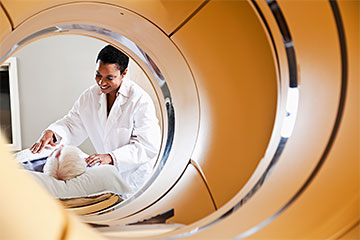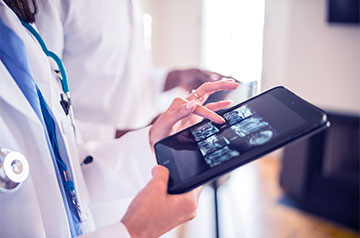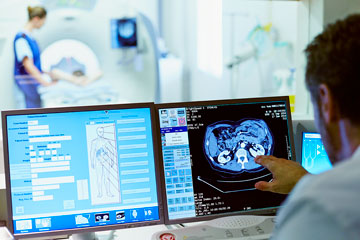Positron emission tomography (PET) scans use a custom-made dye containing special tracers, called radionuclides, to detect signs of illness. The tracers, which are injected and absorbed by tissues and organs, gather in chemically active areas of the body. Areas where this activity occurs show up as bright spots on a scan and are often indicators of disease.
What is a CT Scan?
Computed tomography (CT) scans combine X-ray technology with computer imaging capabilities. Sometimes available in three-dimensional format, CT scans allow health care providers to view soft tissues, bones and organs from a variety of angles. From cardiac scans to images of the head or abdomen, medical teams use this cross-sectional imaging to aid in diagnoses, evaluate treatments and provide guidance during surgeries and other procedures.
How Does a PET/CT Scan Work?
 The most common parts of the body scanned during cross-sectional imaging (PET/CT) are from the head to the abdomen – often to check for tumors or to determine the source of headaches or other chronic conditions.
The most common parts of the body scanned during cross-sectional imaging (PET/CT) are from the head to the abdomen – often to check for tumors or to determine the source of headaches or other chronic conditions.
During a PET/CT scan, you will be asked to lie on a table that will travel through the two rings of the scanner, producing PET and CT scans nearly simultaneously. Images produced will appear in horizontal “slices”, giving doctors a better understanding of how your body is functioning, as well as a detailed picture of your bones, tissues and organs.
Before your PET/CT scan, you will receive an injection of a custom-made dye, or special tracer, so your doctor(s) can view chemical activity in your body. You will receive a solution designed for the unique reason your doctor ordered a scan. The most common choice is fluorodeoxyglucose, a non-allergenic compound designed to mimic naturally occurring glucose (a simple sugar).
The tracers in the compound are stored in abnormal cells, and the imaging specialist can locate high levels of cellular activity when these areas become brighter than others. Cells take in sugar as they grow, and cancer cells grow quickly. This means cancer cells are more likely to ingest more sugar and appear as brighter spots on PET/CT scans.
Preparing for a PET/CT Scan
Before a PET/CT Scan, you will need to fast for six hours. During this timeframe, only water is allowed. No food of any kind can be eaten, including chewing gum, hard candy, and even cough syrup, cough drops and lozenges. Check with you physician to see if you should stop taking any medications prior to your test.
Gym workouts and other activities, like bike riding and sports, will also need to be avoided for at least 24 hours before the procedure as heavy activity can affect scan results.
Any procedure-related documents or other materials from the ordering doctor should also be brought in.
In addition, your doctor will need to know if you:
- Have diabetes or any other medical conditions
- Are breastfeeding, or may be pregnant
- have not followed the fasting instructions while preparing for the scan
- If you have any issues with claustrophobia, or if you're unable to stay completely still for an extended period of time. If so, accommodations can be made or a change of plans could be required.
A positive response to any of the circumstances described above could cause unnecessary risks or affect the accuracy of your test results.
What to Expect During a PET/CT Scan
 Before you imaging scan, you will be asked to remove any metal items and change into a hospital gown. An imaging technician will then place an intravenous (IV) catheter in your arm and your blood sugar levels will be checked. If your blood sugar levels are too high, this may interfere with the scan.
Before you imaging scan, you will be asked to remove any metal items and change into a hospital gown. An imaging technician will then place an intravenous (IV) catheter in your arm and your blood sugar levels will be checked. If your blood sugar levels are too high, this may interfere with the scan.
At this point, the technician will consult with the radiologist to determine if the test can proceed. If all is good, the tracer dye will then be introduced through your IV catheter and you will be asked to wait for approximately 60 minutes while it circulates through your bloodstream.
During the procedure, the technician will leave the exam room, but will be able to see you through a control room window. Scanners are equipped with microphones so you can communicate with the technician at any time.
During the scan, it’s important to stay very still. Any motion may make it necessary to start the procedure over to ensure an accurate diagnosis. The images will be examined and more scans will be taken if necessary.
After a PET/CT Scan
After your scan, you will be asked to drink plenty of fluids to help safely flush the special tracers from your blood stream. Normal activity can be resumed right away.
The person performing the scan will not be able to comment on results. He or she will look at images only to determine whether or not more are needed. After the procedure, your scan will be read by a radiologist who specializes in PET/CT scans. The results will then be passed on to the ordering physician in the form of a detailed report, and your doctor will schedule a time to go over the results in person.
PET/CT Scan Risks and Side Effects
Whether used in combination or separately, PET/CT scans are considered low-risk and carry few or no side effects. While the dye used to transport tracers throughout the body in PET/CT scans is radioactive, extremely low doses are used, and scanning is performed quickly to further limit any risk.
Allergic reactions to the dyes used in PET/CT scans are rare. Fluorodeoxyglucose, the substance most often used in PET scans, may cause mild nausea, mild itching or hives in extremely rare instances.
Why It's Important to Schedule a PET/CT Scan
Both PET and CT scans are low-risk procedures that provide important – even lifesaving – benefits. When combined, PET and CT scans are powerful tools used to help prevent, lessen or end the effects of illness on the body.
CT scans provide higher-resolution images than those offered by MRI, or magnetic resonance imaging. The procedure also helps to produce better diagnoses, analyze treatment progress more effectively, and provide pinpoint-accurate guidance during procedures. And no other type of imaging matches the unique ability of PET scans to measure the body's functionality helping radiologists to spot signs of disease earlier than other imaging technologies.
Why Memorial Hermann?
While other facilities do offer PET/CT scans, Memorial Hermann is committed to providing you with a unique combination of service, knowledge, compassion and technology in the Greater Houston area. Our staff receives focused, in-depth training, and we encourage ongoing education to stay current with changing standards and technologies. In addition, we invest in state-of-the-art technology to ensure the highest level of accuracy.
If your doctor has ordered a PET/CT scan, you can count on our team to guide you through the process, with insight, kindness and a commitment to provide the best care possible.
For more information or to schedule PET/CT scan at a Memorial Hermann location near you, call (877) 704-8700.






